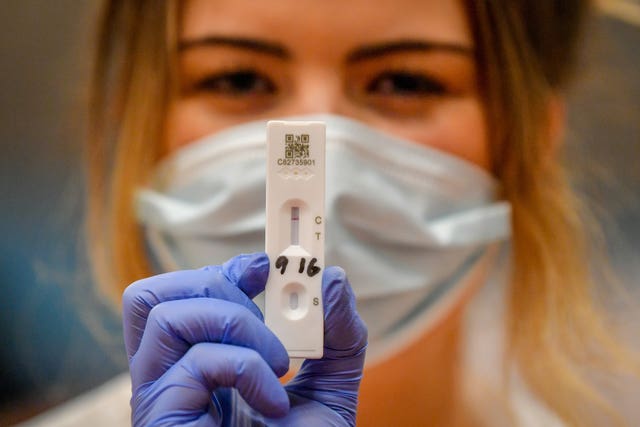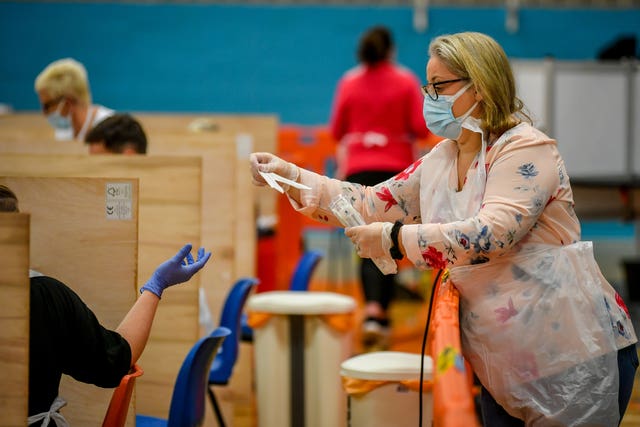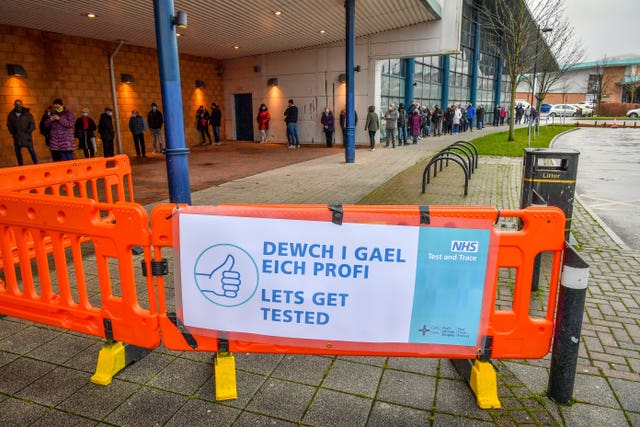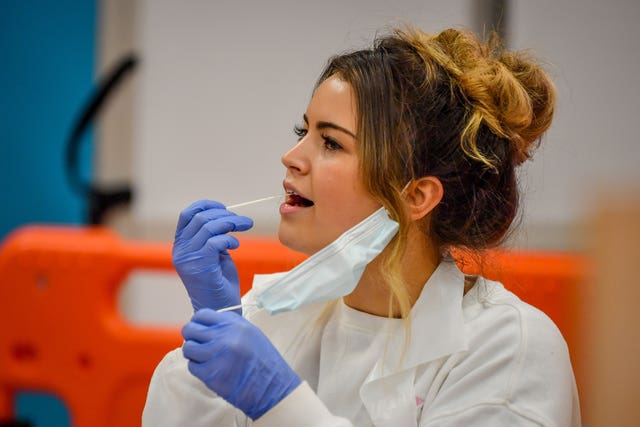Scores of people have turned up at a pilot scheme of mass coronavirus testing in Merthyr Tydfil.
Rapid Covid-19 tests are being offered to the area’s residents and workers even if they do not have symptoms, a week after the town registered the highest rate of new cases in the UK.
Merthyr Tydfil has since seen the biggest drop in cases in Wales from around 770 cases per 100,000 to now below 260 as the effect of the country’s 17-day firebreak begins to work.

The test scheme was launched on Saturday morning at the town’s Rhydycar Leisure Centre, with more sites due to open through Merthyr Tydfil County Borough throughout November.
People huddled under umbrellas to avoid the rain as they lined along the leisure centre, with the first in line waiting more than an hour-and-a-half to be let inside at around 10.30am.
The first member of the public to take a test was 82-year-old Shirley Jones, whose partner of 20 years, Desmond Rogers, 83, had died at the town’s Prince Charles Hospital just 24 hours previously while waiting for cancer treatment which had been delayed due to the pandemic.

She told the PA news agency: “He’d been there for a while, he had bowel cancer. It went to his stomach and his throat. He was at Prince Charles Hospital and that’s where he died.
“I couldn’t say goodbye to him. I couldn’t tell him that I love him or that the lord will be with him. I couldn’t give him comfort.
“I’ve got to do this because I think it’s right that we should all come up here and support the Government and get this test. It’s very important that we do it.
“I could’ve stayed in this morning and not come because I was grieving, but I knew I had to do the right thing in coming up here for myself for our community, and I pray to god that everybody comes up and has a test like I have.
“I think it’s our duty to come up and protect the community. If you don’t do it then we’re never going to get rid of this coronavirus.”

The deputy leader of Merthyr Tydfil County Borough Council, Lisa Mytton, said Ms Jones had set an example for the whole public.
She told PA: “Doesn’t that just say it all. The courage that woman has shown is incredible.
“It’s quite emotional, to know she’s come out here because of what’s impacted her within the 24 hours is incredibly brave thing for her to do.”
The deputy leader said she believed the launch of the testing pilot was the best way to try and reduce the area’s high levels of transmissions.
She said: “I just wonder what other way there would be to do it apart from this way.
“I really am hopeful that it will get everybody out there so we can find and see those people who are asymptomatic walking around unknowingly with coronavirus so they can then self-isolate so we can reduce our transmission rate.
“This will help in the end people being able to see relatives, to get back to some sort of normality.”

She added: “Obviously we didn’t want as many people having coronavirus in Merthyr Tydfil as the numbers have shown, that’s saddened us. But I’m pleased we’ve been chosen to undertake this pilot because if it helps reduce the transmission rate in Merthyr Tydfil then that’s a good thing, definitely.”
Ms Mytton also praised the work of staff to get the site up and running with just a week’s notice.
Last minute plans included using voting booths intended for use at the May 2021 Welsh Parliament instead being used to self-administer test swabs, after dedicated booths supposed to be sent by the UK Government failed to show.
She said: “To get it up and running, get the staff and volunteers, it’s been an incredible effort and I’m so proud everyone’s pulled together.”
Lateral flow tests give results within 20 to 30 minutes, with people who test positive then given a traditional swab test and asked to return home so they can self-isolate immediately.
The pilot will be supported by 165 military personnel, with Brigadier Andrew Dawes, Commander Joint Military Command Wales, one of the first people to get a test on Saturday.
Last week, UK health secretary Matt Hancock said the pilot, which follows one already in place in Liverpool, would provide “vital understanding” on how mass testing can be rolled out across the UK.


















